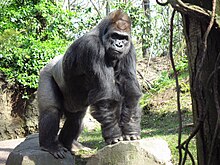Our website is made possible by displaying online advertisements to our visitors.
Please consider supporting us by disabling your ad blocker.
Pongidae
This article needs additional citations for verification. (April 2014) |
| Pongidae Temporal range: Late Miocene to Recent
| |
|---|---|

| |
| Gorilla in the Bronx Zoo | |
| Scientific classification (obsolete) | |
| Domain: | Eukaryota |
| Kingdom: | Animalia |
| Phylum: | Chordata |
| Class: | Mammalia |
| Order: | Primates |
| Suborder: | Haplorhini |
| Infraorder: | Simiiformes |
| Superfamily: | Hominoidea |
| Family: | Pongidae Elliot, 1913 |
| Genera | |
Pongidae /ˈpɒndʒɪdiː/, or the pongids is an obsolete primate taxon containing chimpanzees, gorillas and orangutans. By this definition pongids were also called "great apes". This taxon is not used today but is of historical significance. The great apes are currently classified as Hominidae. This entry addresses the old usage of pongid.
The words "Pongidae" and "pongids" are sometimes used informally for the primate taxon containing orangutans and their extinct fossil relations. For this usage the currently most widely accepted name is Ponginae (or informally Asian hominids or pongines), the orangutan subfamily of the Hominidae or hominids. In current hominid taxonomy there is no “pongid” taxon. The orangutan taxon is now known to be paraphyletic to other (African) hominids. The orangutans are the only surviving species of the subfamily Ponginae, which genetically diverged from the other hominids (gorillas, chimpanzees and humans) between 19.3 and 15.7 million years ago. The subfamilies split somewhat later. The corresponding crown group for this taxon is Hominidae.
Previous Page Next Page


